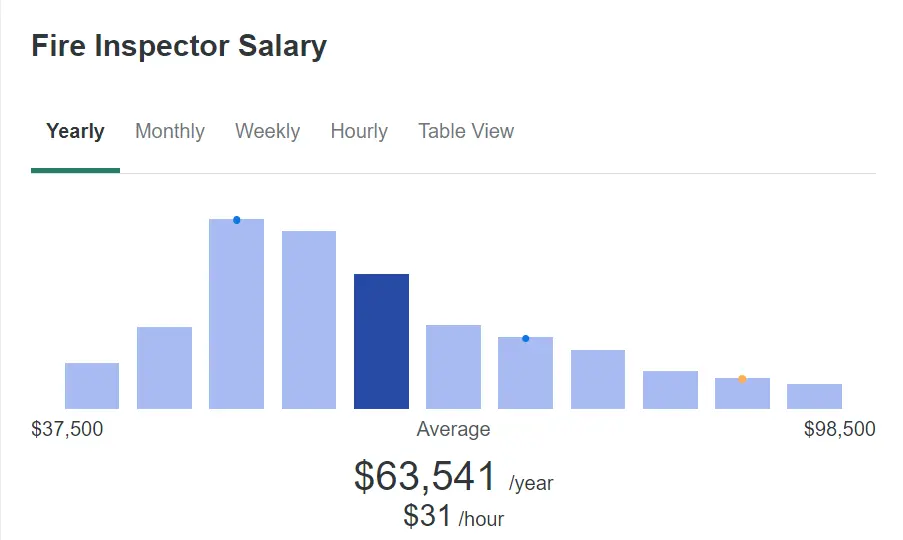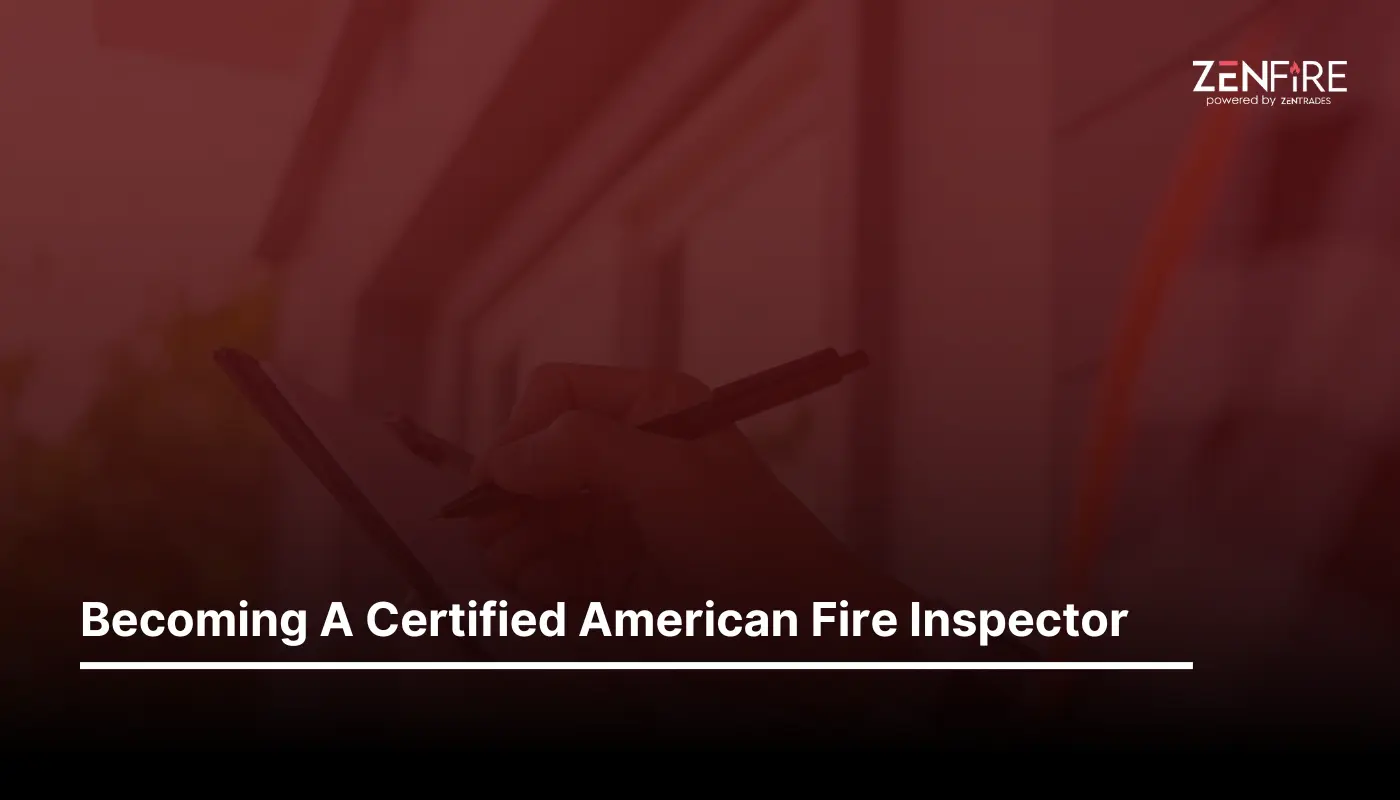Becoming A Certified American Fire Inspector
- Field Service Management
- 9 Min Read
A fire inspector is responsible for protecting people against the probability of fire and has prevention mechanisms in place for when they occur. They ensure that every environment has the lowest chance of a fire breaking out and damaging the surroundings and the American citizens in them.
The occupation of fire inspectors is a complex role that requires a strong level of mental strength, physical capability, and intuitive thinking. Before deciding to go down this road of a fire professional, it is essential to understand this and the responsibility that rests upon their shoulders.
According to the Bureau of Labor Statistics, the overall employment of fire inspectors is expected to grow by 5 percent from 2022 to 2032. This implies an average of 1600 openings for fire inspector jobs each year over that decade. This is a higher average percentage than most occupations and suggests a bright future for American citizens interested in the fire inspector position.
This article will explore every corner of what you need to know about becoming a fire inspector, from their duties and responsibilities, educational requirements, training and experience, skills and qualities, certifications, and salary levels to the organizations that they will represent.
Here What We Cover
What Are The Duties of a Fire Inspector?
The responsibilities of a fire inspector can be put down as simply as protecting American citizens from fire hazards. This protection is their primary goal, and every other duty they take up, whether it is fire inspections, code enforcement, or building awareness of fire safety, is a connection to the same objective in mind.
Although it can seem like a simple job with a pretty straightforward objective, there are so many little tasks that inspectors are required to do, which can often go over people’s heads. So, here is a list of all minute duties that inspectors take up to protect people from dangerous fires,
Look for and search every corner of a building or environment for signs of fire hazards that must be resolved.
They communicate continuously with building architects and contractors and review the building plans for any necessary changes that must be incorporated before or during building construction.
Regularly inspecting fire protection equipment and maintaining their conditions for usability during a fire emergency.
Testing fire safety protection systems, such as fire sprinklers, fire extinguishers, fire alarm systems, manual call points, fire hoses, and similar devices. Inspectors regularly inspect and test these materials to increase the effectiveness of their use if necessary.
Fire inspectors are responsible for regularly conducting public seminars and events that increase the awareness of fire safety and the importance of its implementation. They conduct different themes for a fire safety week and month every year, emphasizing the worst contributors to unnecessary fire hazards and deaths.
Every inspection they conduct needs to be documented, and fire inspectors must store this verification correctly for future reference purposes.
Fire inspectors consider emergency evacuation plans when reviewing building plans and ensuring that a building is fire safety compliant. The plans for fire emergency exits, placement of fire safety equipment, emergency lighting, and fire exit doors and routes must be reviewed, verified, and changed if necessary by inspectors.
Air compressors and fuel storage tanks contribute to fire safety mechanisms and can significantly cause fire hazards. Inspectors are to inspect these regularly and verify that these components are in good condition and not in a position to contribute to causing fire hazards.
Plenty of organizations and industries require burn permits to dispose of unnecessary materials in their environments. Fire inspectors are responsible for providing these permits after investigating the need for one and monitoring controlled burns when they are scheduled to be done.
After the final word and documentation of fire inspectors, they need to conduct regular follow-up visits to every location they’ve sanctioned to ensure that every regulation is followed and that no attempts are made to violate the fire safety laws.
The most important of their duties is ensuring that any environment or building complies with the codes and regulations established by national fire protection organizations like the National Fire Protection Association (NFPA) and the Occupational Safety and Health Administration (OSHA).
Imposing fines and legal consequences on citizens who do not follow regulations after repeated warnings and citations.

Use our free estimate template now
Make winning quotes in minutes—for any industry and any job.
Educational Pathways for Aspiring Fire Inspectors
The road to becoming a fire inspector begins like any other profession: educating yourself on the standard for professional qualifications for fire inspector roles and understanding the responsibilities and the skills needed to become one.
There are different pathways and routes that a person can take to become a fire inspector, meaning there isn’t any specific set of steps that a person needs to take to the position of a fire inspector. So, this article will list down the different types of knowledge you need to excel at the position and responsibility of a fire inspector,
Basic Mathematics: A primary knowledge base of areas, measurements, geometry, calculations, and their applications in the fire industry.
Psychology: Understanding the behavioral traits of humans and the differences in their mannerisms in unique situations.
Administration: An inspector is a leader and must know how to manage their subordinates, including compensation, selection, negotiation, and training.
Electronics: Primary knowledge of computers, today’s advancements, applications, and equipment. A better understanding of these concepts can help better handle inspections with the evolving inclusion of fire inspection software in the picture of fire safety.
Chemistry: Knowledge of chemical materials that can influence fires and fire safety on the field, their compositions, and the significant influences they can have on an environment.
English Language: Speaking, reading, and writing the language is essential to communicating with people and your subordinates while also knowing how to emphasize fire safety.
Training: A fire inspector is expected to train and teach all subordinates, such as technicians, their responsibilities and how to do them right.
The Government: Knowledge of legal laws, procedures, and political processes, representing everything related to fire and national security.
Construction: Expertise in how buildings and other structures are built, processes involved in construction, materials used, tools needed, and repair.
Personal Service: As a fire inspector, you frequently interact directly with citizens and assess their service satisfaction and areas for improvement.
Public Security & Fire Safety: An expert in fire safety policies, like the Fire Code, strategies in promoting fire safety operations, and safeguarding public citizens.
Educational Requirements
The fire inspectors’ employment requirements can vary based on the skills required at various positions. Here are a few minimal requirements that some positions require,
A post-secondary education certificate (Usually EMTs – Emergency Medical Technicians)
A bit of college experience, like awards of recognition in a specific field, a degree is not mandatory. (Fire Science, Fire Protection Engineering, or Chemistry)
A high school diploma or any equivalent education level.
Continuing Education for Fire Inspectors
For a position like a fire inspector in the fire service, it is critical to stay current with the latest information, technology, rules, regulations, and procedures regarding fire protection. This is why the government has given fire inspectors licenses for their operations in an area.
These licenses expire after a specified period (the Fire Inspector I Certificate is valid for four years), after which inspectors are only allowed to operate if they have renewed their license.
A requirement for obtaining a renewal license is Continuing Education. The concept is exactly as it sounds: inspectors must renew their knowledge of what they know and put in the required amount of hours to re-educate themselves. We’ll take a look at this in more detail later below.
Essential Skills for Fire Inspectors
Fire inspectors have a crucial role in society. They protect American citizens from fire hazards and maintain dependable fire protection systems and building codes until the completion of construction and even after.
It takes a lot of courage and responsibility to want to be a fire inspector, a role with so much importance. Hence, it requires a broad collection of skills and strengths and depends on the individual’s dedication to the job.
Here is a list of skills every fire inspector or wannabe should try to develop and become an expert in. It can be challenging for a person to excel at all these skills, but it is not a requirement that a fire inspector has to be perfect at all of these; a general touchpoint on all of these skills is the best scenario,
Technical Skills Every Fire Inspector Needs
Expertise: Theoretical knowledge of all fire laws, regulations, codes, and safety parameters established by organizations like the NFPA and the International Code Council (ICC).
Usability: Knows how to use general fire safety equipment like fire extinguishers, fire protection suits, and fire hoses more effectively.
Inspections: Knowledge about the frequency of inspections that need to be conducted and what needs to be checked for during every type of inspection.
Technical Knowledge: Know how to use some technical software applications, like Email, presentation software, accounting software, Internet Processing, and document management software, to manage their tasks more efficiently.
A Leader: Has the skills to manage multiple cadets under their wing and educate them on how to be more effective and efficient officers, creating a group of able fire inspectors-to-be.
Interpersonal Skills for Effective Fire Inspections
Attention to Detail: A fire inspector must be meticulous during their processes and able to take in every detail in an environment. Every detail counts towards finding and resolving a fire hazard that could become a big problem.
Concern For Society: A fire inspector must be sympathetic and empathetic towards people and their behavior. Allowing yourself to want to help others and feel for their mistakes is how inspectors easily protect citizens from and discover fire hazards.
Integrity: A big part of being a fire inspector is being honest in your work. Integrity is the base upon which you can build safer environments for American citizens, and losing that honesty towards your job can lead to inefficient protection systems, unlawful building plans, and ineffective equipment that can culminate in unnecessary injuries and even deaths.
Flexibility: Integrity is essential, but sometimes flexibility is crucial for an inspector. Allowing people to learn from their mistakes, allowing them a chance to resolve their errors, and being open to constant change are all that a fire inspector is expected to be.
Tolerating Stress: Fire protection can create highly stressful environments that are generally difficult to handle due to life safety factors and the probability of death in such situations. Fire inspectors are the leaders here and must learn to push away stress and be the main factor of confidence for everyone else during emergencies.
Smart & Quick Thinking: Situations related to fire protection often do not allow much time for thinking and then acting. Fire inspectors need to make instant, intelligent decisions and ensure the best solution for the safety of people during fire emergencies and even smarter choices during the planning of fire emergency procedures.
Problem Sensitivity: The inherent skill to tell whether something is wrong or might go wrong and resolve it before it has the chance to cause an actual problem.
Perceptive: Inspectors must be perceptive of the individuals they are surrounded by within a specific environment and understand the nature of their behavior. Perceiving people around them allows inspectors to assess any situation better.
Fire Inspector Training
This is often considered the most crucial part of becoming a fire inspector. Gaining experience in the field and enacting what it means to be a licensed fire inspector can show you precisely what you need to know and progressively teach you your role.
Inspector training comprises many segments that take a reasonable amount of time to complete before you can be a fire inspector on the field. Even after becoming a licensed inspector, continuing education keeps you on the line that you need to keep learning and evolving regularly.
Like other professions, being a fire inspector requires training in your skills throughout your profession and repetitive testing of these skills. This is because the fire industry is volatile, and fire safety regulations can always change to protect American citizens better.
Education
As mentioned, the first step in training yourself is learning the basics. Your education can serve as a brilliant platform for your expertise in fire safety, but this solely depends on how far and how many years you have accumulated your skills, refining and toning them simultaneously.
Online programs can also help you develop those theoretical skills to a better extent. But your level of theory can only help you so much before you have to get on the field and experience it for yourself.
Reviewing the job postings for the exact positions you’re aiming for can give you a better understanding of the requirements other officials expect you to have before applying for the position.
After this, there is only one route that you can take from here, which is the value of practical experience.
Practical Experience Required for Fire Inspectors
Firefighting
Before becoming a fire inspector, many people gain experience as a firefighter or a similar fire protection officer role. This can be done by volunteering at your local fire station and inspecting if there are any significant opportunities to learn the duties of a fire inspector.
This isn’t an absolute requirement to becoming a fire inspector. Still, it can significantly improve the chances of grabbing an inspector position when you’ve been through the thick of it and understand the risks of being a firefighter.
This again correlates to the job position you are looking for and the exact requirements. Ensure to go through this and see if it would boost your chances.
Fire Academy
Fire academies are one of the best places to learn about the fire safety industry and gain skills to help you excel at being an advanced firefighter or a fire inspector.
The reason that this is the best place to learn is that these academies specialize in turning you into a fire professional. Be it theoretical expertise, practical knowledge, or even extra training, a fire academy will give you everything you need and provide you with a clear path of what to do next to get the fire inspector position.
Academies also regularly update their information, so when you leave an academy, you’re up to date on any new rules and regulations for fire safety and the current requirements for fire compliance.
Apprenticeships
Similar to volunteering at a fire station, apprenticeships are the same type of training. Some fire workers in the industry need an extra pair of hands to help them with their tasks.
While providing an opportunity to help other fire professionals, it also allows you to work in an environment that you want to get used to, do work that you want to do more proficiently over the next few years and learn from professionals who have been doing the job for a couple of years.
Look for apprenticeship programs that provide the exact position you are looking for and the location you prefer to work in. This can help develop the actual skills you need for that position and also gives you an idea of this physical position was what you were looking for.
Overview of Fire Inspector Certifications, Licenses
Nationally recognized fire inspection certifications are extra components that decide the exact specifications of the position you’re looking for. These certifications are not only a mandatory requirement but also give you the additional expertise you need in those subjects you are interested in. That first certification can exponentially increase your expertise in that particular fire service division.
The risk involved in the fire inspector position is high. Hence, the government requires more dependable certifications, which increase the authority that an individual has better experience in the particular skill and is perfect for the position.
After receiving the necessary training, you must take certification exams to become a fire inspector. Passing these exams gives you a license to operate as a fire inspector for a specified period before renewing your license. The National Fire Protection Association is the organization that finalizes how fire inspectors are to be tested and conduct these certification examinations.
Here are the different levels of gaining certification for being a fire inspector,
Certified Fire Inspector
Certified Fire Inspector, II
Certified Fire Inspector and Plan Examiner
Certified Building Inspector
Certified Building Plans Examiner
Certified Fire Protection Specialist
How to Maintain and Renew Fire Inspection Licenses
As mentioned above, after getting a fire inspector license, you’re not always verified to continue your duties as an inspector. After some time, the license expires, and you need to renew it to continue your duties.
As mentioned before, the concept of continuing education can differ for different positions and certifications and even roles and responsibilities. But to give you a better idea of how this works, here are the requirements of continuing education for a certification done under the Texas Commission on Fire Protection (TCFP),
Employed certificate holders must earn at least 18 hours of continuing education per year of their license period.
The head of the department for a fire department can decide on the subject of education for anyone employed in that division.
In addition to the 18 hours, the license holder must complete an additional two hours of continuing education annually for every discipline that the holder is appointed to.
Continuing Education can be completed for two different level subject areas, Level 1 and Level 2.
Level 1 continuing education comprises repeating previous education of basic-level skills that an inspector should have.
Level 2 continuing education consists of training for a new skill the inspector has yet to learn.
The Difference Between Investigators and Inspectors
Both fire inspectors and investigators often need clarification due to the similarity in their responsibilities in fire prevention. Still, both are diverse and unique when looking at the tasks included in their day-to-day tasks.
Investigators and inspectors are sub-extensions of the same duty to protect American citizens from fire hazards and ensure that no lives are lost due to these harmful dangers.
Fire inspectors analyze environments and try to detect fire hazards before they cause any significant problems. Their primary duty is to be the physical implementation of the fire codes and regulations that national organizations like the NFPA have established and implement fire suppression techniques.
While inspectors are a preventive class of heroes, that is where the responsibilities of investigators differ,
Fire investigators are called in when the cause of a fire cannot be immediately determined at a scene.
Investigators apply their knowledge to the different causes of fire, types of fire, fire patterns, and the surrounding environment.
They investigate for specific fire patterns, collect evidence and analyze the materials, conduct residue analysis, and find signs that may point to an act of arson. This is why investigators are also called arson investigators.
With their findings and final analysis, they are asked to testify in court and bring their results to the table, where they can find people guilty of arson with their evidence.
Get posts like this in your inbox.
Keep learning how to run a 5-star business with our bi-weekly newsletter.
Pay For Fire Inspectors
A critical aspect of any position or job you look for is the final compensation you get for your hard and honest work. Fire inspectors get paid a sustainable and good amount of money, which comes with the extra responsibilities it entails for people’s safety.
According to ZipRecruiter, as of the end of June 2024, the average annual salary for a fire inspector in the United States of America is $63,541 per year.

Better ways of understanding this number are given below for more straightforward metrics of measurement according to your requirements,
- $30.55 per hour
- $1,221 per week
- $5,295 per month
This is the average rating of money that fire inspectors make throughout the country. Of course, this value is bound to change according to different states, varying requirements for positions, skill levels, and years of experience in the field.
ZipRecruiter states that annual pay for different regions and positions can be as high as $98,500 and as low as $37,500. The pay currently ranges from $52K to $72K for all fire inspectors.
Here is a list of average annual salaries, monthly pay, weekly pay, and hourly wages for all 50 states of America, giving you a look at whichever state you need to know about,
State | Annual Salary | Monthly Pay | Weekly Pay | Hourly Wage |
New York | $70,495 | $5,874 | $1,355 | $33.89 |
Vermont | $69,282 | $5,773 | $1,332 | $33.31 |
California | $68,046 | $5,670 | $1,308 | $32.71 |
Maine | $66,080 | $5,506 | $1,270 | $31.77 |
Idaho | $65,372 | $5,447 | $1,257 | $31.43 |
Washington | $64,862 | $5,405 | $1,247 | $31.18 |
Pennsylvania | $64,564 | $5,380 | $1,241 | $31.04 |
Massachusetts | $63,774 | $5,314 | $1,226 | $30.66 |
Alaska | $63,370 | $5,280 | $1,218 | $30.47 |
New Jersey | $63,135 | $5,261 | $1,214 | $30.35 |
New Hampshire | $62,985 | $5,248 | $1,211 | $30.28 |
Oregon | $62,646 | $5,220 | $1,204 | $30.12 |
North Dakota | $62,584 | $5,215 | $1,203 | $30.09 |
Wisconsin | $62,183 | $5,181 | $1,195 | $29.90 |
Wyoming | $61,626 | $5,135 | $1,185 | $29.63 |
Hawaii | $61,396 | $5,116 | $1,180 | $29.52 |
Colorado | $61,065 | $5,088 | $1,174 | $29.36 |
Indiana | $60,546 | $5,045 | $1,164 | $29.11 |
Nevada | $59,918 | $4,993 | $1,152 | $28.81 |
New Mexico | $59,752 | $4,979 | $1,149 | $28.73 |
Minnesota | $59,669 | $4,972 | $1,147 | $28.69 |
Arizona | $59,295 | $4,941 | $1,140 | $28.51 |
South Dakota | $59,148 | $4,929 | $1,137 | $28.44 |
Montana | $58,401 | $4,866 | $1,123 | $28.08 |
Ohio | $58,114 | $4,842 | $1,117 | $27.94 |
Rhode Island | $58,026 | $4,835 | $1,115 | $27.90 |
Delaware | $57,918 | $4,826 | $1,113 | $27.85 |
Alabama | $57,672 | $4,806 | $1,109 | $27.73 |
Virginia | $57,289 | $4,774 | $1,101 | $27.54 |
Connecticut | $56,893 | $4,741 | $1,094 | $27.35 |
Iowa | $56,786 | $4,732 | $1,092 | $27.30 |
Illinois | $56,355 | $4,696 | $1,083 | $27.09 |
Mississippi | $56,280 | $4,690 | $1,082 | $27.06 |
Maryland | $56,143 | $4,678 | $1,079 | $26.99 |
Tennessee | $55,484 | $4,623 | $1,067 | $26.68 |
Utah | $55,341 | $4,611 | $1,064 | $26.61 |
Nebraska | $55,095 | $4,591 | $1,059 | $26.49 |
Missouri | $54,358 | $4,529 | $1,045 | $26.13 |
South Carolina | $53,807 | $4,483 | $1,034 | $25.87 |
Georgia | $53,726 | $4,477 | $1,033 | $25.83 |
Oklahoma | $53,355 | $4,446 | $1,026 | $25.65 |
Texas | $53,284 | $4,440 | $1,024 | $25.62 |
Kansas | $52,983 | $4,415 | $1,018 | $25.47 |
North Carolina | $52,697 | $4,391 | $1,013 | $25.34 |
Louisiana | $52,096 | $4,341 | $1,001 | $25.05 |
Kentucky | $50,618 | $4,218 | $973 | $24.34 |
Michigan | $50,598 | $4,216 | $973 | $24.33 |
West Virginia | $49,863 | $4,155 | $958 | $23.97 |
Arkansas | $48,089 | $4,007 | $924 | $23.12 |
Florida | $47,547 | $3,962 | $914 | $22.86 |
Source: ZipRecruiter
Here is another list giving you the Top 10 Cities with a higher average salary rating than the average for the whole country. This can give you an idea of where to look to become a fire inspector if you haven’t decided on a particular location yet,
City | Annual Salary | Monthly Pay | Weekly Pay | Hourly Wage |
Santa Clara, CA | $80,982 | $6,748 | $1,557 | $38.93 |
San Francisco, CA | $77,344 | $6,445 | $1,487 | $37.18 |
Castro Valley, CA | $76,776 | $6,398 | $1,476 | $36.91 |
Marysville, WA | $76,418 | $6,368 | $1,469 | $36.74 |
San Jose, CA | $74,952 | $6,246 | $1,441 | $36.04 |
Alexandria, VA | $73,797 | $6,149 | $1,419 | $35.48 |
Ripon, CA | $73,613 | $6,134 | $1,415 | $35.39 |
Redwood City, CA | $73,436 | $6,119 | $1,412 | $35.31 |
Oakland, CA | $73,353 | $6,112 | $1,410 | $35.27 |
Hayward, CA | $73,228 | $6,102 | $1,408 | $35.21 |
Source: ZipRecruiter
The Responsibility Of A Fire Protection Officer
After reading this article, you’re probably still wondering whether the path of a fire inspector is the right one for you. The truth is that you will never honestly know if this is what you want to do unless you try it out and see for yourself how it feels to be a fire protection officer.
All the information is here. Take your time understanding what it means to be a fire inspector through this blog and analyze if this is your decision. An easier way to also better analyze the actual practicality of being a fire inspector is shadowing one during an internship for volunteering at your local fire department.
Becoming a fire inspector is a considerable responsibility. Still, it also gives you the opportunity and satisfaction to know that you are saving people’s lives and helping them live safer.
Hoping this article will help make your decision easier, here’s a collection of more blogs about fire safety, fire inspection, fire safety equipment, and fire inspectors to help provide you with more information. Check them out for a more detailed look at fire safety concepts and the importance of fire safety compliance.

Explore a better way to grow your business. Book a free demo now!
Get organized, win jobs, and wow customers.
Book A Free Demo with ZenTrades Today!
Related Reading
Why Your Field Software Management Software Needs QuickBooks Integration
ZenTrades Why Your Field Service Management Software Needs QuickBooks Integration Read More Request Demo...
Read MoreZenTrades How To Manage Electrical Service Agreements Like...
Read MoreZenTrades The Best 5 Jobber Alternatives In 2023...
Read More

